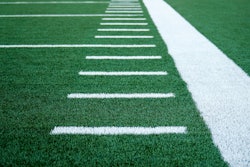
A federal judge's approval Friday of the settlement of three athlete-compensation antitrust cases against the NCAA and the Power Five conferences will fundamentally change college (and possibly Olympic) sports forever.
The ruling allows colleges and universities to directly pay athletes for the use of their name, image and likeness within the framework of an annual cap that is based on a percentage of the Power Five athletic department revenues. Those payments could begin as early as July 1.
As a part of the settlement, current and former athletes involved in the lawsuits will receive shares of $2.8 billion in damages, which will be dispersed over a 10-year period.
NCAA president Charlie Baker framed the settlement as a stabilizing moment for college sports.
"Approving the agreement reached by the NCAA, the defendant conferences and student-athletes in the settlement opens a pathway to begin stabilizing college sports," Baker wrote in an open letter posted to the NCAA's website. "This new framework that enables schools to provide direct financial benefits to student-athletes and establishes clear and specific rules to regulate third-party NIL agreements marks a huge step forward for college sports."
The agreement scraps previous limits on the number of scholarships a school can award in favor of sport-by-sport roster limits. However, because immediate implementation of those roster limits would have resulted in thousands of athletes losing their spots on Division I teams, a judge ruled that implementation of that rule could be postponed until the 2025-26 school year, if not longer.
While athletes will still have the opportunity to enter into NIL deals, those deals will now be scrutinized by the new College Sports Commission to determine whether the deal has a "valid business purpose" and is "within a reasonable range of compensation."
The College Sports Commission will not be run by the NCAA but by the conferences themselves. The commission is tasked with investigating alleged malfeasance, enforcing rules and penalizing rule-breakers.
Gabe Feldman, director of the Tulane Sports Law Program and Tulane University's associate provost for NCAA compliance told the USA Today that this is the formal beginning of the "greatest transformation in college sports history, period."
"I think there are as many unanswered questions — and probably more unanswered questions — than answered questions that will come from the settlement," Feldman said.
While a final cap on school payments to athletes has yet to be set, the NCAA estimates that amount to be somewhere around $20.5 million per school annually. The cap is set to increase annually by 4%, except in Years 4, 7 and 10, when new baselines would be established based on the defined set of Power Five athletics department revenues.
Objections to the settlement, which can be appealed, were many and varied, with Title IX equivalencies topping the list of concerns. Many schools — Georgie and Texas Tech to name two — have already publicly stated that they plan to allocate a large portion of their payments to football and basketball players.
The future of Olympic sports are also in limbo, as three-quarters of the nearly 600 American athletes who competed in the Paris Olympics were former college athletes.
According to Sports Illustrated, a generally acknowledged breakdown of payments to athletes by sports will fall along these parameters: 75% to football players, 15% to men’s basketball players, 5% to women’s basketball players and 5% to all other sports combined. That leaves some Olympic sports out in the cold when it comes to distribution of the annual $20.5 million most schools will pay out.
“The elephant in the room is, what are the implications for Olympic sports?” Louisville swimming and diving coach Arthur Albiero, who is the president of the College Swim Coaches Association told SI.com. “My concern is that the value of Olympic sports, that scale has shifted a little bit. Producing Olympians, All-Americans, great GPAs, great citizens — where does that fit into the metrics now? It’s a dire moment.”
Former Arizona State swimmer Grant House, the namesake of the settlement and the first to file an antitrust lawsuit against the NCAA and it conferences is hopeful that every sport will find its way in this new era.
“The biggest thing is working together to handle these changes,” House says. “Making sure we’re working as a community—that’s when swimming is at its strongest. That’s why the sport is so amazing, because it’s so collaborative. The only constant in our life is change, so walking together into that change is important.”
Baker himself acknowledged that there are still a lot of challenges ahead, as the NCAA, the conferences and athletes seek to make the new rules work.
"Significant challenges remain, including attempts to force student-athletes to be classified as employees despite their leadership at all levels opposing this," Baker wrote. "In addition, attacks persist on college sports' ability to set national rules regarding years of eligibility — the policies that enable the next generation of young people to access educational and athletics opportunities. And states continue to undercut one another in a race to the bottom by challenging the ability of the NCAA and conferences to establish and enforce rules that maintain level playing fields. The NCAA and college sports leaders have made tremendous, positive change in recent years, but only Congress can address these issues."
Nevertheless, Baker believes the settlement is success.
"In the weeks ahead, we will work to show Congress why the settlement is both a massive win for student-athletes and a road map to legislative reform. The Division I Decision-Making Working Group will complete its work building the new governance structure, and the Division I Council and Board of Directors will take action on the necessary policies to implement the settlement."





































